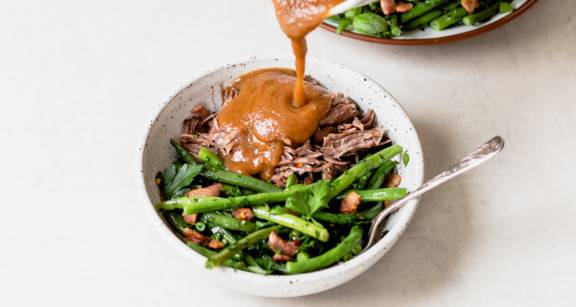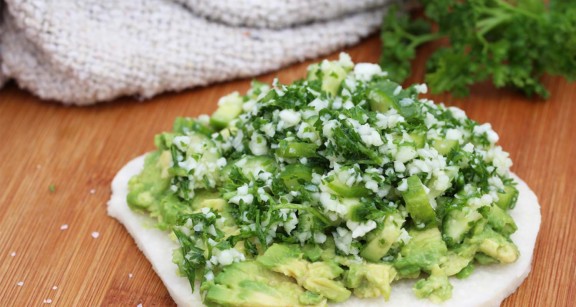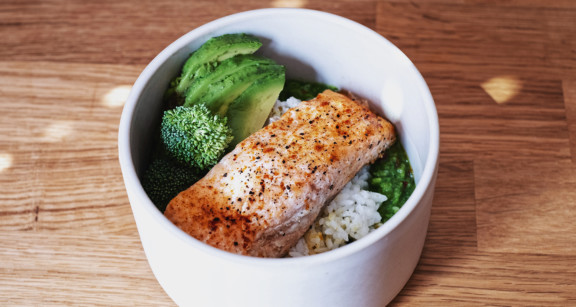Prebiotics
You’ve probably heard about probiotics with their rise in popularity over the last few years. But do you know about prebiotics? Although not as widely talked about as probiotics, prebiotics deserve their moment in the spotlight. They offer a wealth of health benefits that contribute to your body functioning well.
Let’s explore prebiotics, prebiotics vs probiotics, prebiotic foods, the benefits of prebiotics and prebiotic supplements.
What are Prebiotics?
Prebiotics are dietary fibers that are too tough for your body to digest, break down or absorb. Prebiotic fiber passes through the stomach and small intestine to the colon, where it can be fermented by gut bacteria. The prebiotic fiber serves as food for probiotics (“good” bacteria) in your gut. In other words, prebiotics are like fuel for probiotics, helping them create a beneficial bacteria population for optimal gut health.
Gut bacteria, after fermenting the prebiotics, produce short-chain fatty acids. These circulate through the blood and can affect not only the gastrointestinal tracts but reach other organs too. Prebiotics for your gut health benefit your microbiome but can positively affect many other parts of your body, as we’ll explore.
You can get prebiotics either through food or supplements. You can find prebiotic fiber in underripe bananas, onions, garlic, oats, barley, lentils and almonds. As a supplement, you can take a blended tablet that includes prebiotic, probiotics and postbiotics. Or, you can brew yourself a cup of prebiotic Bulletproof Coffee as part of your morning routine. There are a ton of ways you can get more prebiotics in your system, depending on what works best for you.
Benefits of Prebiotics
Prebiotics can affect many functions in your body. Here are some interesting ways you can benefit from prebiotics:
Better Gut Health
Evidence suggests that short chain fatty acids, the by-product of prebiotics after they’ve been fermented by probiotics, are crucial for the maintenance of gut health.1 The production of short chain fatty acids helps regulate pH, mucus production, provides fuel for other cells and contributes to the body’s immune function.
Immunity Support
Prebiotics can potentially support your immune system, in part due to their role in increasing the population of protective microorganisms.2 Prebiotics’ influence on amplifying the body’s immune response can contribute to helping defend against infections and illnesses.
Improved Mood
Some evidence suggests that a healthy gut microbiome may influence mood and mental health.3 That’s because there seems to be a connection between the gut and brain, or what’s called the gut-brain axis. The gut-brain axis is a two-way biochemical signaling that communicates between the central nervous system and the gastrointestinal tract. Prebiotics may play an important role in improving mental functions.
Weight Management Support
Some research suggests that the addition of prebiotics to a balanced gut microbiome may play a role in weight management.45 Beneficial gut bacteria can affect energy metabolism and the storage of fat. By promoting the growth of these bacteria, prebiotics may help in weight management.
The Science-Backed Benefits of Prebiotics
There are so many ways that prebiotics can potentially affect other areas of your body besides your gut health.
Heart Health
Emerging research shows the potential of prebiotics to help support cardiovascular health.6 Heart health may be linked to the gut’s microbiota imbalance. Prebiotics may help improve the body’s microbiota and thereby support a healthy heart.
Allergies
Another fascinating study reveals that prebiotic supplementation could help prevent allergies.7 Although more research in this field is needed, what we know so far is promising. Prebiotics directly or indirectly affect the systems responsible for overcoming skin, food and respiratory allergic symptoms. Researchers are currently exploring how maternal prebiotic supplementation during pregnancy could help prevent allergies in children.
Metabolism
Prebiotics may play an important role in influencing metabolism and inflammation, according to a recent study.8 Adapting a diet to include more prebiotics could contribute to better outcomes for many with health-related concerns. In fact, diet even has the potential to have more influence than environmental and genetic factors. You are what you eat is as relevant as ever.
The Bulletproof Approach to Prebiotics
At Bulletproof, we approach prebiotics with the same scientific-backed evidence as our other products. We want to provide you with the most effective ingredients to fuel your journey towards optimal wellness.
Our range of prebiotic supplements makes it easy for you to get more in your daily routine. For example, collagen protein powder with prebiotics is an unflavored powder that mixes in with your favorite hot or cold drinks. Adding it to your coffee or smoothie is a simple way to make sure you are consistently getting an adequate dose of prebiotics.
We also offer a convenient prebiotic fiber supplement that’s perfect for taking with you on the go. If you’re traveling, a prebiotic supplement can potentially help you prevent or treat digestive discomfort that comes with a change in diet.
Prebiotics, Probiotics and Postbiotics
Choosing a prebiotic supplement can be overwhelming, but we’ve made ours straightforward. We created a supplement that includes prebiotics, probiotics and postbiotics since they work best when taken together.
We chose the shelf-stable bifidobacterium lactis probiotic strain since it’s well-researched. Then, we paired it with prebiotics to provide the building blocks and fuel for the probiotics to thrive. And finally, we added postbiotic Tributyrin to get gut relief, faster. Combining prebiotics, probiotics and postbiotics creates a synergy that better supports your body’s microbiome.†
Our Supplement Testing Standards
We don’t leave ingredient effectiveness to guesswork. We undertake an extensive science-backed approach to all steps of our production process. We source high-quality, clean ingredients, that never include soy, gluten, GMOs, or artificial fillers.
Our team works with third-party labs to confirm the effectiveness of the ingredients we use, at doses that are scientifically supported by research. We make sure to verify the potency and actives in our products to achieve the right levels for best results.
Our supplements are aligned with FDA regulations. They meet the standards for strength, composition, and purity. To ensure consistent quality, we analyze and test the chemical and physical properties of every production lot. Plus, we have a specialized food safety expert team that oversees the risk assessment process of ingredients. This team is dedicated to your safety and well-being.
The supplement testing process goes through four steps. First, we make sure the ingredients are present and not diluted. Then, we check for purity to make sure there are no harmful contaminants. Then, we verify that there’s the right dose of active ingredients with the claims on the label. And finally, we test the composition to ensure the supplement matches the label specifications.
Does it take longer? Yes. Is it worth it? Absolutely yes. This analysis tells us (and you) that we are offering the highest standards for efficacy and safety. Our extensive testing ensures that our supplements are accurately labeled, effective, and safe.
Recipes for Prebiotic Foods
If you want to increase your daily intake of prebiotics, cooking with prebiotic foods is one way to go. You may already have some of the ingredients at home; garlic, asparagus, leeks, onions, and bananas are just some examples. Explore some of our most popular prebiotic recipes to try today.

Easy Prebiotic Bulletproof Coffee With Collagen Protein

Prebiotic Bulletproof Coffee

Smoked Salmon and Garlic Spinach Breakfast Sandwich

Gluten-free Vegetable Latkes

Garlicky Paleo Bread Sticks

Creamy Paleo Onion Gravy

Gluten-Free Tabbouleh

Salmon Protein Bowl With Broccoli and Leeks

Keto Spicy Tuna Sushi Burrito
Learn More About Prebiotics
Prebiotic Articles
Best High-Fiber Foods for Gut Health
Restoring Gut Flora: How To Balance Gut Bacteria
Move Over Probiotics. Synbiotics Are the Gut Supplement You Need
Baking With Sugar Substitutes 101: Everything You Should Know
Inside Bulletproof: You Already Know About Prebiotics and Probiotics—Time to Meet Postbiotics
Why Prebiotics Are More Important Than Probiotics for Your Gut
How to Improve Gut Health and Support Your Microbiome
Gut Health & Sleep: 6 Ways to Support Your Microbiome for Better Rest
FAQs
Some cooking and processing methods may reduce the prebiotic content of foods. For example, some prebiotics, like inulin and fructooligosaccharides (FOS), are heat-sensitive. When exposed to high temperatures for extended periods, these prebiotics can break down or degrade, potentially reducing their prebiotic content. Eating raw or minimally processed foods may help get the most prebiotics into your system.
Prebiotics and probiotics have a symbiotic relationship and work best when taken together. Prebiotics provide nourishment for probiotics. In other words, prebiotics may help improve the survival of probiotics in the gut. In turn this can potentially lead to a healthier microbiome.
There is no “best” supplement since it depends on your health goals and dietary preferences. However, there are a few things to look out for. First, check the type of prebiotic strains and potential benefits they offer. Choose a high-quality prebiotic supplement from a reputable brand. Make sure it has undergone third-party testing for purity and potency. Look for certifications that ensure quality testing. And finally, read the ingredient list to avoid supplements with additional ingredients like unwanted fillers or additives.
It depends. Even though you can get prebiotics from meals, it doesn’t mean that your diet usually includes prebiotic foods. For example, legumes, seaweed, and chicory root, although high in prebiotics, don’t necessarily make it to your meal planning every week. Choosing a prebiotic supplement can help you ensure you’re getting the proper dose for your health goals.
Some people may experience digestive discomfort, such as gas or bloating, when first trying a prebiotic supplement. If you have a sensitive digestive system, start with a low dose and gradually increase it if your body can tolerate it. If you are unsure, or have a digestive disorder, speak with your healthcare provider to determine if prebiotic supplements are right for you.
Prebiotic supplements may play a role in weight management, but their effects are just one aspect of achieving and maintaining a healthy weight. You must also consider your diet, level of physical activity, genetics, and lifestyle, for example. Having a healthy gut may help reduce appetite and promote feelings of fullness, potentially leading to eating less.9 However, research in this field is ongoing, and prebiotics by no means represent a weight-loss supplement.
It depends. The condition of your gut microbiome composition and overall health are just two factors that may influence how your body reacts to prebiotic supplements. In some cases, people may notice changes in digestive comfort, bowel regularity or energy levels within a few days or weeks. To get the most out of prebiotic supplements, it’s important to take them consistently for the best outcomes.